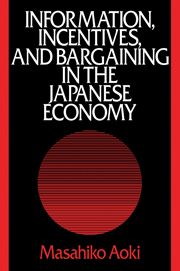 Information, Incentives and Bargaining in the Japanese Economy
Information, Incentives and Bargaining in the Japanese Economy This book presents a microanalysis of the Japanese economy from the perspectives of information, incentive, and bargaining-game theories. It is not another parable of Japan's economic success.
Many people think that the Japanese economic system does not altogether fit the textbook model of the market economy. Is it because the Japanese economic system is culturally unique? Or is it that the textbook description is too simplistic for analyzing the rich reality of modern market economies of various types? In this book, I have sought to describe and explain the competitive workings of the Japanese microeconomic system in terms familiar to Western economists, although I have tried not to ignore entirely the possible impact of cultural factors.
In pursuing this goal, however, I have been compelled to examine critically some textbook notions about the microstructure of the market economy (e.g., hierarchy as the alternative to the market, the firm as a property of stockholders, market-oriented contracts as the incentive scheme, innovation as a direct application of invention, among others) that have strongly shaped and influenced the economists' approach to industrial organization. Although these notions constitute an appropriate foundation for the analysis of the highly market-oriented Western economy, it is necessary to go beyond those “specific” notions in order to arrive at a more complete understanding of the Japanese economy. At one level, therefore, this book may be regarded as a study of comparative industrial organization.
To save this book to your Kindle, first ensure no-reply@cambridge.org is added to your Approved Personal Document E-mail List under your Personal Document Settings on the Manage Your Content and Devices page of your Amazon account. Then enter the ‘name’ part of your Kindle email address below. Find out more about saving to your Kindle.
Note you can select to save to either the @free.kindle.com or @kindle.com variations. ‘@free.kindle.com’ emails are free but can only be saved to your device when it is connected to wi-fi. ‘@kindle.com’ emails can be delivered even when you are not connected to wi-fi, but note that service fees apply.
Find out more about the Kindle Personal Document Service.
To save content items to your account, please confirm that you agree to abide by our usage policies. If this is the first time you use this feature, you will be asked to authorise Cambridge Core to connect with your account. Find out more about saving content to Dropbox.
To save content items to your account, please confirm that you agree to abide by our usage policies. If this is the first time you use this feature, you will be asked to authorise Cambridge Core to connect with your account. Find out more about saving content to Google Drive.